| Key Takeaways |
|---|
| Building a strong website is essential for musicians to showcase their work, interact with fans, and grow their audience. |
| Key steps for building a powerful website include choosing a catchy domain name, finding reliable hosting, utilizing SEO techniques, and creating an appealing electronic press kit (EPK). |
| Expanding a mailing list through sign-up forms, email marketing techniques, and exclusive content helps musicians connect with fans and promote their music effectively. |
| Collaborating with music blogs and establishing relationships with bloggers can introduce musicians to new audiences and generate opportunities for gigs, interviews, and collaborations. |
| Networking, attending conferences and events, leveraging industry contacts, gigging and touring, utilizing streaming platforms, creating engaging content, and utilizing music promotion services are effective strategies for promoting music without relying solely on social media. |
Feeling overwhelmed about the constant use of social media when promoting your music?
What if I told you there are ways to get your music heard and build a following without relying on social media?
As a fellow musician, I understand how frustrating it can be to feel like social media is a necessity. This sucks because music is our passion, but the other aspects can be draining.
In this article, I’ll share various strategies to help you achieve your promotional goals without using social media.
Building A Strong Website
Having a solid website is a valuable asset. It’s a platform where you can showcase your work, interact with fans, and grow your audience.
Here are some fundamental steps for building a powerful website.
Domain Name And Hosting
First, you needed a catchy domain name. This has to represent your music and your identity as an artist and be a brand that’s easy to remember.
Next, search for a reliable hosting provider. You should be looking for the following:
- Good uptime
- Fast page load speeds
- Excellent customer support
Hostinger, SiteGround, and Cloudways are some of the best hosting providers out there.
Using SEO To Your Advantage
Using search engine optimization (SEO) techniques allows you to drive organic traffic to your site. Start by researching relevant keywords that your target audience might use to find your music.

Implementing these keywords within your website’s content helps it to rank higher in search results.
Make sure to optimize your site’s structure to improve your website’s visibility in search engines. This includes:
- Meta tags: Using title and description elements regarding your music for the search engines to understand what your website is about.
- Headings: An opportunity to use keywords in your site that will affect your search ranking.
- Image ALT tags: Where you describe what is taking place in the image.
Creating a Powerful Electronic Press Kit
An electronic press kit (EPK) is vital for promoting music. It contains important information like a biography, discography, and contact details. Also, include high-quality photos and press coverage.
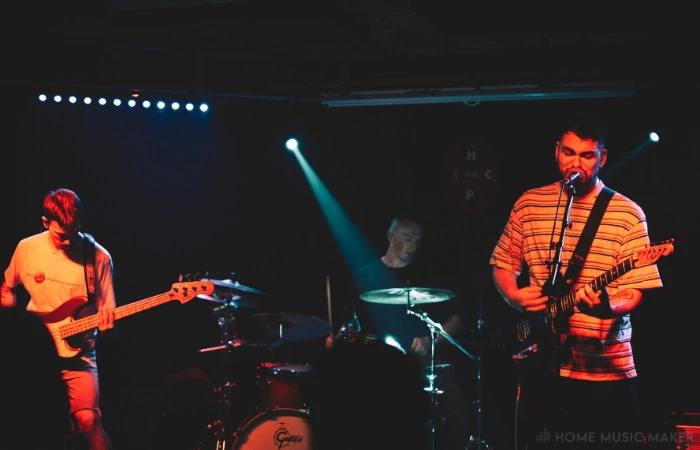
Including your EPK on your website helps you to stand out from the competition. In turn, this leads to attracting more gig opportunities, interviews, and collaborations.
It’s an indispensable resource for music professionals and fans. An EPK allows them to learn more about your work and get in touch with you.
Expanding Your Mailing List
One effective way to connect with fans and grow a fanbase is by creating and expanding a mailing list.
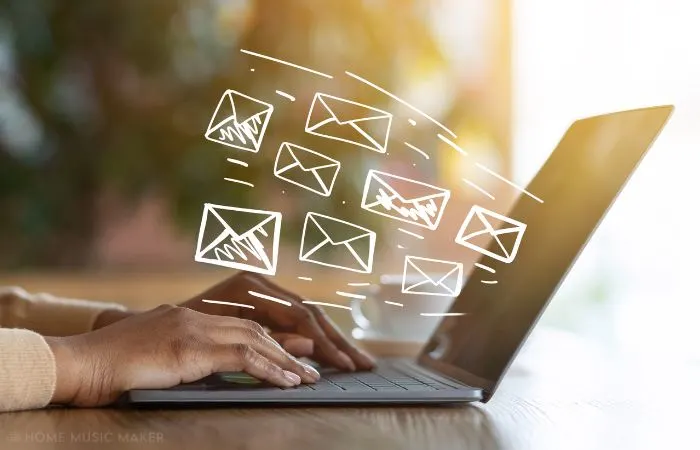
In this section, the following shall be discussed:
- Creating a mailing list
- Email marketing techniques
- Tips for growing your email list
Creating A Mailing List
You can start a mailing list by setting up a sign-up form on your website or at live events.
Explain the benefits of joining your mailing list, like:
- Exclusive content
- Early access to new music
- Updates about your shows
It’s pivotal to keep track of the obtained email addresses in a secure and organized manner, adhering to privacy laws and guidelines.
Email Marketing Techniques
With a mailing list in place, you can now use various email marketing techniques to engage with your fans. One thing to always keep in mind is to provide value in every email you send.
This means sharing:
- Useful information
- Sneak peeks
- Special promotions your fans will appreciate
Try to maintain a consistent email schedule, so your fans can look forward to any updates.
Focus on an attractive layout and design to make your emails visually appealing. This includes using eye-catching images and clear headings to make the content easy to digest.
Personalize the emails by addressing subscribers by their names.
To help with this, you can separate your mailing list based on their preferences and engagement. This helps you to tailor the content to different audience segments.
You can also use email marketing services such as Mailchimp, Beehiiv, and ConvertKit to assist your email marketing needs.
Growing Your Email List
Collaborating with other artists and participating in giveaways/contests can attract new subscribers to your email list.
You can leverage your live shows by collecting emails in person or through QR codes linked to your sign-up form.
Another useful strategy is creating exclusive content, only available to subscribers of the mailing list.
The content can be anything, such as behind-the-scenes videos or free downloads.
This encourages more people to join, converting them from casual listeners into dedicated fans.
READ NEXT:
It may be tempting to take shortcuts here. However, our article on things to avoid if you want a successful career in music will explain why this is not a good idea.
Collaborating With Music Blogs
Music blogs are powerful platforms that can introduce your work to a new audience. The readership of these blogs is often people with a passion for fresh music.
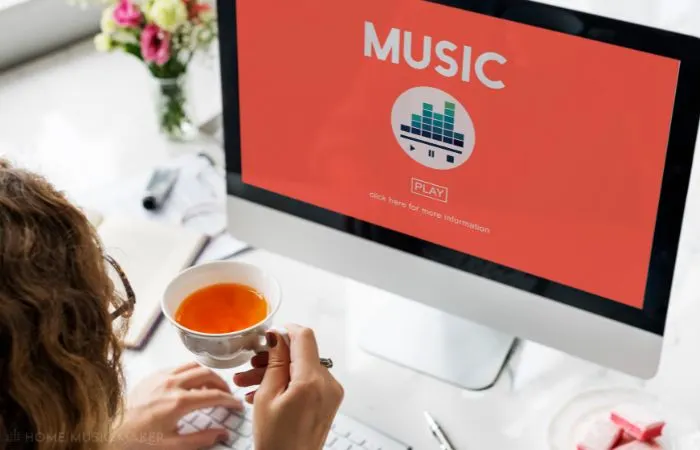
This section provides a brief guide on how to find music blogs in your genre and how to establish relationships with bloggers.
Finding Music Blogs In Your Genre
To find the right blogs for your music, you can use a search engine and look for phrases such as “[your genre] music blogs” or “[your genre] music reviews.“
Another method is to check out blog directories or aggregators. A great example of this is Hypebot, which features a list of the top 100 music blogs and their RSS feeds.
This can save time and help you find respected and influential blogs within your genre.
Establishing Relationships With Bloggers
Now is the time to establish relationships with the bloggers.
Begin by reaching out to them via email or through their website’s contact form. Personalizing your message and expressing genuine interest in your work is crucial.
A good rule of thumb is to mention specific articles or reviews you enjoyed.
When reaching out to bloggers, keep your message concise and offer a clear value proposition.
Let bloggers know what sets your music apart and why their readers may want to listen.
Providing extra assets like high-quality photos, a short bio, or an exclusive track can also help build a stronger connection. It’s all about making the collaboration more enticing for the bloggers.
Remember, bloggers often receive many emails and might be unable to respond to every single one. You can follow up courteously after a week or two to remind them.
It’s important to respect their time. They likely have varying schedules and priorities when it comes to reviewing music.
Networking And Industry Connections
Networking is invaluable for promoting music without social media. Building industry connections is a must in this hectic world.
Below are some tips and experiences on how to strengthen your network and create more opportunities for your music.
Attending Conferences And Events
You can make connections with people in the industry, other musicians, and fans through music events.

At these events, talk to people with similar interests and exchange ideas, and learn more about the music industry.
These events include music festivals, workshops, industry trade shows, and more. You can meet many new people and discover new opportunities because of it.
By sharing your love for music and engaging with others, you may be able to open doors that you wouldn’t have been able to online.
Search for local events or even travel to explore the broader music scene.
Leveraging Industry Contacts
Along with attending events, it’s paramount to make the most out of your industry contacts.
Building relationships with people in the music business can help you to succeed.
Industry contacts can introduce you to music producers, promoters, and musicians.
By being reliable and professional, you’ll find that people are more willing to recommend or collaborate with you.
Regularly follow up with your contacts by sending a quick email, text, or phone call to catch up or share updates on your music. This helps you to stay on their radar and receive their advice or help.
Networking and industry connections can play a significant role in promoting your music and growing your presence as an artist.
So, don’t be afraid to meet new people, share your passion, and watch your music career flourish!
Gigging And Touring
One of the most effective ways to promote music without social media is gigging and touring.
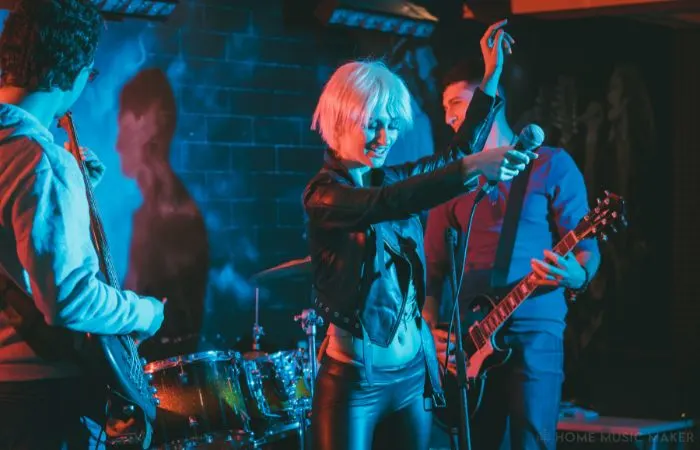
Live performances allow you to connect with your audience personally and sell merchandise to expand your fan base.
Booking Gigs
You can find gigs by contacting local promoters, venue owners, and event organizers. Try to ensure that these all cater to your genre, and send your EPK to them.
Networking with other musicians in your genre can also lead to gig opportunities.
Going to open mic nights, jam sessions, and local festivals can help you meet other artists who might want to perform with you or work on events together.
Organizing Tours
Once you have a few gigs under your belt, you could consider organizing a small tour.
Planning a tour involves several steps, such as:
- Mapping out a route
- Contacting venues and promoters
- Budgeting for expenses like travel, accommodation, and food
It helps to make a tour schedule with specific dates. This allows you to create marketing material, such as posters and flyers, to promote the shows.
Using email marketing is a great way to reach fans, generating excitement and ticket sales.
To keep fans engaged, you can offer exclusive content like behind-the-scenes footage and encourage them to attend your shows.
Touring With Other Bands
Joining forces with a more established or similar-sounding band can create networking opportunities. Reach out to bands you admire and discuss how your music can complement each other.
By collaborating on a tour, you can reduce costs and reach a larger audience.
Additionally, touring with other bands lets you learn from their experiences, which helps to develop your music career.
READ NEXT:
For a more detailed look at this, check out our article on how music collaborations work.
Streaming Platform Strategies
In today’s digital era, focusing on streaming platforms is one of the best ways to promote your music without relying on social media.
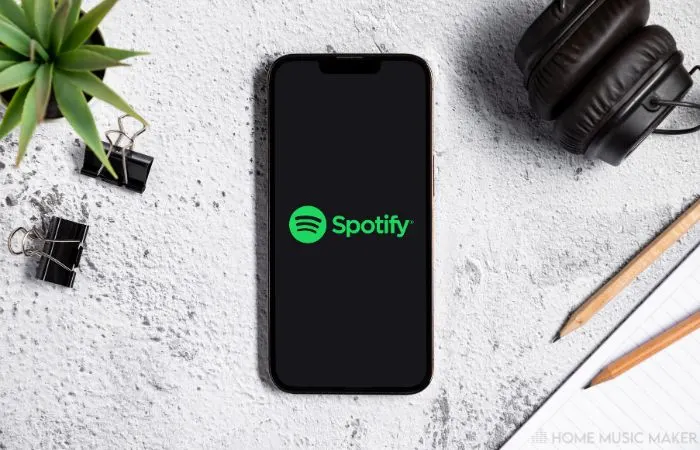
Some effective strategies for making the most of streaming services are:
- Using Spotify playlists
- Getting featured on Apple Music
- Optimizing artist profiles
Using Spotify Playlists
Getting featured on popular Spotify playlists is a great way to promote your music and reach new fans.
First, make sure your music is available on the streaming platform through a distributor like DistroKid.
Then, research playlists that fit your genre and target audience and connect with playlist creators.
Share your tracks and explain why they would be a good fit for their playlists.
It’s also beneficial to create your own playlists and include your music along with other similar artists.
Getting Featured On Apple Music
To start, utilize Apple Music for Artists. Here you can access useful tips and tools for promotion. This includes creating custom QR codes to share your songs or albums.
Afterward, put in the effort to build relationships with playlist curators by networking and engaging with them online.
Remember to always be genuine in these interactions. Share how your music would benefit their playlists and why it’s worth featuring.
Optimizing Artist Profiles
Always keep artist profiles on streaming platforms updated and optimized.
Artist tools on Spotify and Apple Music are great for:
- Customizing your profile
- Displaying your latest releases
- Showcasing your brand
Furthermore, include appealing visuals and a compelling bio to give listeners a glimpse into who you are as an artist.
Lastly, update your profiles with new content. This can be recent releases and promotional materials.
Creating Engaging Content
Creating engaging content is imperative in promoting your music. This content must captivate your fans, widen your audience, and showcase your music.
Music Videos
To visually bring your songs to life, creating music videos can elevate your music promotion game. These videos often feature an artistic representation of the song’s themes.
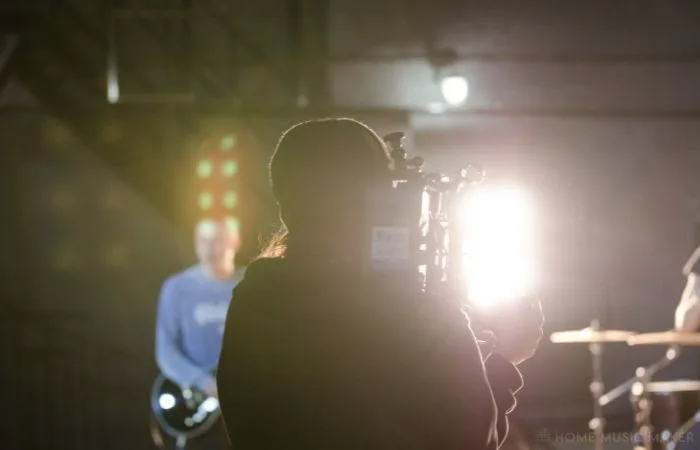
Sharing your music videos on platforms like YouTube, Vimeo, and Dailymotion provides excellent visibility.
It allows fans to discover your songs through searches and recommendations.
Behind-The-Scenes Footage
There’s something truly special about allowing fans to peek behind the curtain and witness the creation of your music.
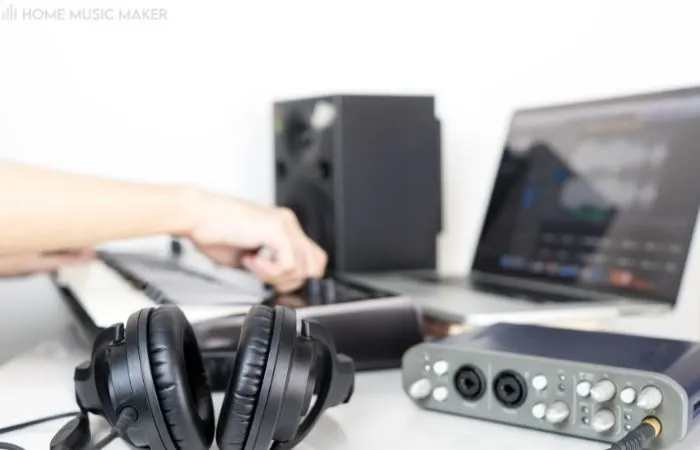
You can build a stronger connection with your audience through sharing:
- Behind-the-scenes footage from recording sessions
- Live performance preparation
- Daily life vlogs
This humanizing, candid content showcases your passion for your craft and your dedication to the creative process.
Podcasts And Interviews
Taking part in podcasts and interviews is a great way to share the backstory and inspiration behind your music.
These conversations let you dive deeper into the following:
- Your creative process
- The stories behind your songs
- Your personality
Podcasts are a great addition to your content marketing efforts, providing another way for fans to engage with your work and vision.
Utilizing Music Promotion Services
Utilizing music promotion services can be very effective as a musician looking to promote your music without social media. These services can help get your music out there and reach new audiences.
Groover
Groover is a great platform for promoting your music without relying on social media.
It connects you with bloggers, playlist curators, and other industry professionals who can help increase the reach of your music.
You can submit your music to these professionals and get feedback, features on their platforms, and exposure through playlists.
The customizable promotional strategy provided is definitely significant in promoting your music.
Using A PR Agency
Using a public relations (PR) agency is another way to promote your music without social media.
A good PR agency can help you create a customized promotion plan that will target your desired audience.
They can also provide opportunities for interviews, features, and event appearances.
Furthermore, they can help you build relationships with industry professionals and media outlets.
Although using a PR agency can be expensive, the value they bring to the promotion of your music is long-lasting and impactful.
Effective Advertising Strategies
The following advertising strategies will help you promote your music without solely relying on social media.
Facebook Events
While Facebook is technically a social media platform, Facebook Events is a valuable tool. You can use it for promoting in-person shows or concerts.
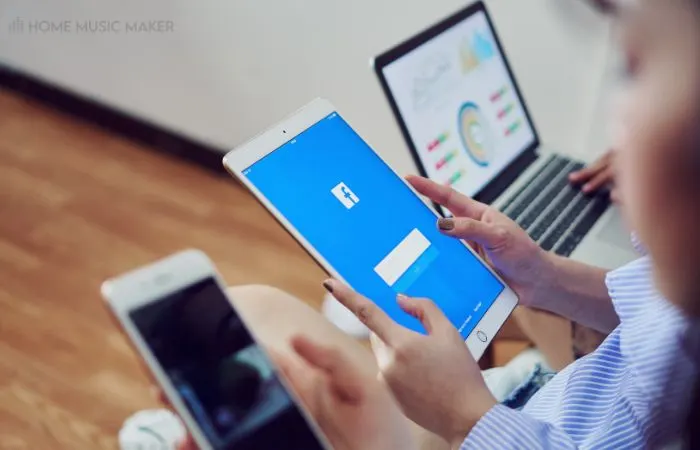
Facebook Events allow you to engage with fans directly. You can also provide necessary information, such as venue details and ticket links.
Plus, fans who RSVP to these events can invite their friends, reaching a possibly wider audience organically.
It’s recommended not to push the event into people’s faces too much, as this can put them off attending it. Trust me. I’ve learned this the hard way.
Sponsorships And Partnerships
One way to find success in promoting your music is through sponsorships and partnerships. You could look to do this with local businesses or other creative individuals.
- Local businesses can provide a location for performances and selling your music. These can be businesses such as bars, cafes, and record stores.
- Other artists within your genre can offer shared gigs and collaborative projects. This allows both parties to benefit from each other’s networks and fan bases.
While being friendly and genuine, you can highlight the benefits of collaboration for everyone involved.
You can see that there are many ways to promote music without social media. Although it can be difficult, you can implement these techniques to expand your reach and develop a loyal fan base.
You just need perseverance, creativity, and authentic connections.
Related Questions
What Are Some of The Benefits of Promoting Your Music without Social Media?
– You can reach a wider audience. Social media platforms are limited in the number of people who can see your content. By promoting your music through other channels, you can reach people who are not on social media.
– You can build stronger relationships with your fans. When you interact with fans directly, you can get to know them better and build stronger relationships. This can lead to increased engagement and support for your music.
– You can control your message. When you promote your music through your own channels, you have complete control over the message that you are sending. This means that you can ensure that your message is consistent with your brand and your goals.
What Are Some of The Challenges of Promoting Your Music without Social Media?
– It can be more difficult to reach a large audience. Social media platforms are a great way to reach a large number of people quickly. Without social media, it can be more difficult to get your music in front of a large audience.
– It can be more time-consuming. Promoting your music without social media requires more time and effort. You need to find other channels to promote your music, and you need to put in the work to build relationships with fans.
– It can be more difficult to measure results. It can be difficult to track the results of your promotional efforts when you are not using social media. This can make it difficult to see what is working and what is not.
READ NEXT:
In order to succeed once you’ve promoted your music, read our guide on surviving the music industry.

 Want to connect with other music producers for help and guidance?
Want to connect with other music producers for help and guidance?